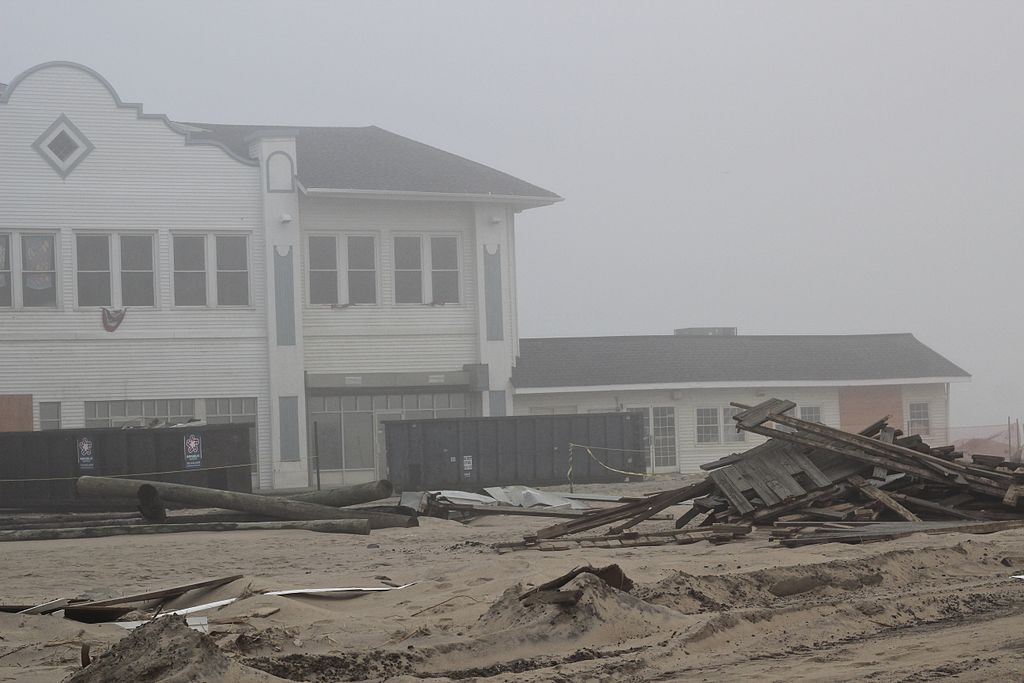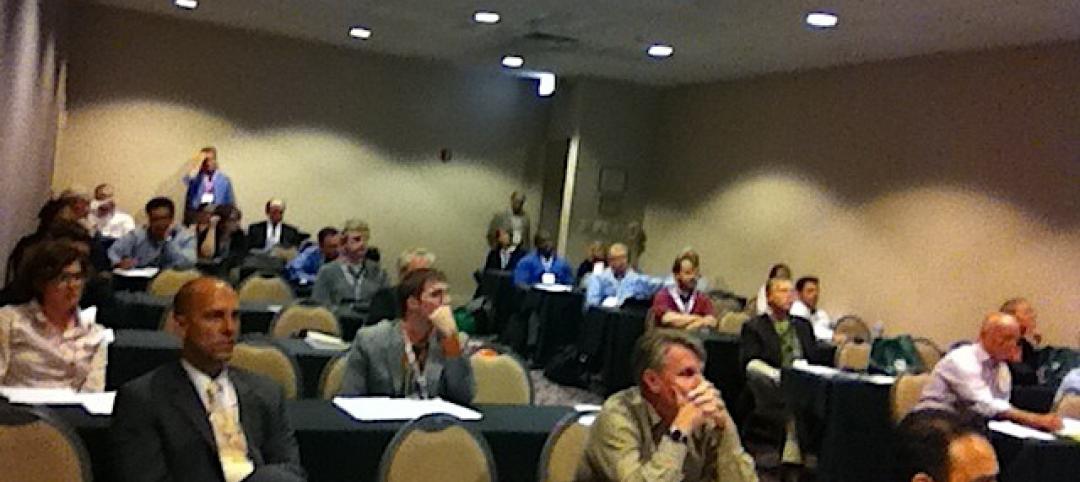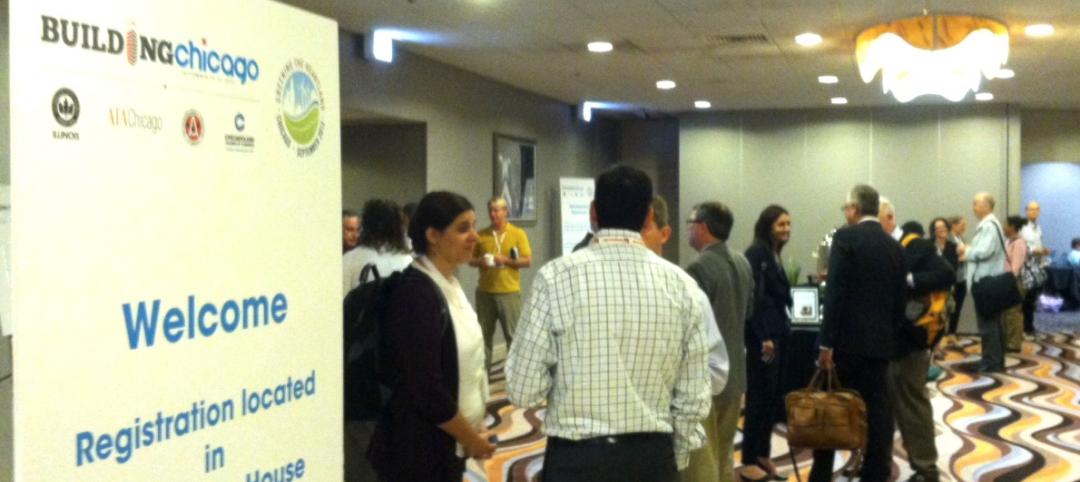Leaders of America’s design and construction industry – along with building owners and operators - for the first time have agreed to promote resilience in contemporary planning, building materials, design, construction and operational techniques as the solution to making the nation’s aging infrastructure more safe and secure.
CEOs of almost two-dozen leading design and construction industry associations with more than 700,000 members generating almost $1 trillion in GDP today used the occasion of “Building Safety Month” to issue a joint statement on resilience, which can be found here.
The statement was unveiled at a press conference at the National Building Museum, where a major exhibition titled Designing for Disaster presents design and building solutions for disaster mitigation, opened May 11.
“We recognize that natural and manmade hazards pose an increasing threat to the safety of the public and the vitality of our nation,” reads the statement, in part. “We further recognize that contemporary planning, building materials, design, construction and operational techniques can make our communities more resilient to these threats.”
The CEOs committed their design and construction sector organizations to significantly improve the resilience of the nation’s entire built environment through research into new materials, construction procedures and other methods to improve the standard of practice.
Among other things, they also committed the industry to educating itself through continuous learning; to advocating for effective land use policies; to responding to disasters alongside first responders; and to planning for future events, with a strategy for fast recovery.
“Resilient design places architects at the center of the solution, with particular emphasis on the private, non-governmental sectors," said American Institute of Architects CEO Robert Ivy, FAIA. “I would like to congratulate my fellow leaders in the design and construction sector for joining together to make sure resiliency is not viewed as just a fad but remains front and center in our efforts moving forward.”
In addition to the AIA, here is a list of organizations signing onto the joint statement on resilience:
American Council of Engineering Companies
American Planning Association
American Society of Civil Engineers
American Society of Interior Designers
American Society of Landscape Architects
American Society of Plumbing Engineers
ASHRAE
Associated Builders and Contractors
Associated General Contractors of America
Building Owners and Managers Association
International Code Council
International Interior Design Association
Lean Construction Institute
National Association of Home Builders
National Institute of Building Sciences International Facility Management Association
National Society of Professional Engineers
Royal Institute of Chartered Surveyors
Urban Land Institute
U.S. Green Building Council
About The American Institute of Architects
Founded in 1857, members of the American Institute of Architects consistently work to create more valuable, healthy, secure, and sustainable buildings, neighborhoods, and communities. Through nearly 300 state and local chapters, the AIA advocates for public policies that promote economic vitality and public wellbeing.
Members adhere to a code of ethics and conduct to ensure the highest professional standards. The AIA provides members with tools and resources to assist them in their careers and business as well as engaging civic and government leaders, and the public to find solutions to pressing issues facing our communities, institutions, nation and world. Visit www.aia.org.
Related Stories
| Oct 18, 2013
Researchers discover tension-fusing properties of metal
When a group of MIT researchers recently discovered that stress can cause metal alloy to fuse rather than break apart, they assumed it must be a mistake. It wasn't. The surprising finding could lead to self-healing materials that repair early damage before it has a chance to spread.
| Sep 30, 2013
Smart building systems key to new Wisconsin general aviation terminal’s net zero target
The Outagamie County Regional Airport’s new 8,000 sf general aviation terminal was designed to achieve net zero.
| Sep 19, 2013
What we can learn from the world’s greenest buildings
Renowned green building author, Jerry Yudelson, offers five valuable lessons for designers, contractors, and building owners, based on a study of 55 high-performance projects from around the world.
| Sep 19, 2013
6 emerging energy-management glazing technologies
Phase-change materials, electrochromic glass, and building-integrated PVs are among the breakthrough glazing technologies that are taking energy performance to a new level.
| Sep 11, 2013
BUILDINGChicago eShow Daily – Day 3 coverage
Day 3 coverage of the BUILDINGChicago/Greening the Heartland conference and expo, taking place this week at the Holiday Inn Chicago Mart Plaza.
| Sep 10, 2013
BUILDINGChicago eShow Daily – Day 2 coverage
The BD+C editorial team brings you this real-time coverage of day 2 of the BUILDINGChicago/Greening the Heartland conference and expo taking place this week at the Holiday Inn Chicago Mart Plaza.
| Aug 30, 2013
Local Government Report [2013 Giants 300 Report]
Building Design+Construction's rankings of the nation's largest local government design and construction firms, as reported in the 2013 Giants 300 Report.
| Aug 30, 2013
State Government Report [2013 Giants 300 Report]
Stantec, Jacobs, PCL Construction among nation's top state government design and construction firms, according to BD+C's 2013 Giants 300 Report.
| Aug 28, 2013
Federal Government Report [2013 Giants 300 Report]
Building Design+Construction's rankings of the nation's largest federal government design and construction firms, as reported in the 2013 Giants 300 Report.
| Aug 26, 2013
What you missed last week: Architecture billings up again; record year for hotel renovations; nation's most expensive real estate markets
BD+C's roundup of the top construction market news for the week of August 18 includes the latest architecture billings index from AIA and a BOMA study on the nation's most and least expensive commercial real estate markets.

















